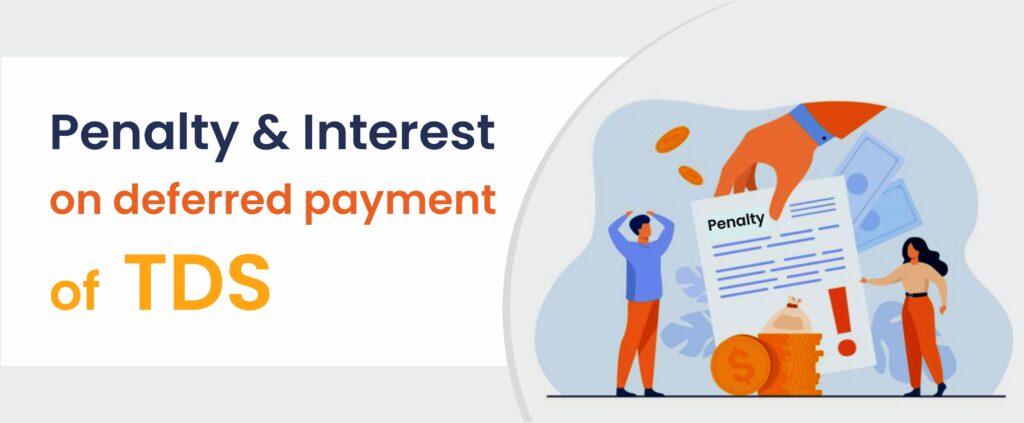Section 271H: Penalties for Failure in TDS/TCS Statement Filing
Staying compliant with tax regulations is absolutely essential for the smooth operation of any business in India, big or small. Among the most critical compliance areas are Tax Deducted at Source (TDS) and Tax Collected at Source (TCS). TDS is the tax deducted by a payer before making certain payments like salary or rent, while TCS is the tax collected by a seller at the time of selling specific goods or services. Both are vital mechanisms for the government to ensure regular tax collection. However, failing to meet your obligations, specifically regarding the filing of TDS/TCS statements (also known as returns), can lead to significant financial trouble. This is where Section 271H penalties come into play.
Understanding Section 271H of the Income Tax Act, 1961, is crucial for small business owners and even salaried individuals who might find themselves responsible for deducting or collecting tax (like TDS on rent over ₹50,000 per month). This section specifically outlines the penalties for failing to file TDS/TCS statements on time or furnishing incorrect information within them. The potential financial hit makes understanding Section 271H penalties India-wide a necessity for anyone acting as a deductor or collector. This post will delve into what these statements are, detail the penalties under Section 271H, differentiate them from late filing fees, explain potential waivers, and most importantly, guide you on how to ensure compliance and avoid these costly penalties.
Understanding TDS and TCS Statements
Before diving into the penalties, let’s quickly recap what TDS and TCS involve and why filing their respective statements is so important. These mechanisms ensure tax is collected closer to the point of income generation. For a broader understanding of tax services offered in India, you can explore TAXATION SERVICES IN INDIA.
What are TDS and TCS?
TDS (Tax Deducted at Source) Explained
Tax Deducted at Source, or TDS, is a system where the person or entity responsible for making specific types of payments (the ‘deductor’) deducts a certain percentage of tax before releasing the payment to the recipient (the ‘deductee’). This applies to various payments, including salaries, interest earned, commission, brokerage, rent exceeding certain limits, and professional or technical fees. The deducted tax is then deposited with the government on behalf of the deductee. Common TDS statements include Form 24Q (for TDS on salaries), Form 26Q (for TDS on payments other than salaries), and Form 27Q (for TDS on payments made to non-residents). The core responsibilities of a deductor are to deduct the correct amount of tax, deposit it with the government within the specified timeframes, and accurately report these deductions by filing the relevant quarterly TDS statements. Businesses looking to maintain their financial records can benefit from setting “Up An Accounting System for My Small Business” (Set Up An Accounting System for My Small Business).
TCS (Tax Collected at Source) Explained
Tax Collected at Source, or TCS, operates slightly differently. Here, the seller of certain specified goods or services (the ‘collector’) collects tax from the buyer (the ‘collectee’) over and above the sale price. This applies to transactions like the sale of alcoholic liquor for human consumption, tendu leaves, timber obtained under a forest lease, scrap, minerals like coal or iron ore, and significantly, the sale of a motor vehicle exceeding ₹10 Lakhs in value. The primary TCS statement is Form 27EQ, which needs to be filed quarterly. Similar to the deductor’s role in TDS, the collector is responsible for collecting the correct tax amount, depositing it with the government promptly, and filing accurate quarterly TCS statements detailing these collections.
The Importance of Filing TDS/TCS Statements
Filing TDS and TCS statements is not optional; it’s a mandatory requirement under the Income Tax Act, 1961. These statements, commonly referred to as TDS/TCS returns, serve a dual purpose. Firstly, they provide the Income Tax Department with comprehensive details of all the tax deducted or collected by you during a specific period (usually a quarter), allowing them to track tax inflows and verify compliance. Secondly, and crucially for the recipient, the information filed in these statements enables the deductee or collectee to claim credit for the tax already deducted or collected from them when they file their own income tax returns. Without this filing, the recipient cannot get credit, leading to potential disputes and double taxation issues. These statements are generally required to be filed quarterly, and adhering strictly to the due dates is paramount to avoid penalties. You can stay updated on deadlines using the official Income Tax Compliance Calendar.
Deep Dive into Section 271H Penalties
Failure to comply with the mandatory filing requirements for TDS/TCS statements can attract penalties under the Income Tax Act. Section 271H is the specific provision that deals with these consequences.
What is Section 271H of the Income Tax Act?
Section 271H directly addresses the penalty for failure in TDS/TCS filing and also penalizes the submission of incorrect information in these statements. It acts as a deterrent against non-compliance and ensures that deductors and collectors fulfill their responsibilities accurately and promptly. The Section 271H penalties can be triggered primarily under two circumstances:
- Failure to file the TDS/TCS statement: If a deductor or collector fails to file the required quarterly statement (like Form 24Q, 26Q, 27Q, or 27EQ) by the prescribed due date.
- Furnishing incorrect information: If the statement filed contains inaccurate details, such as an incorrect Permanent Account Number (PAN) of the deductee/collectee, incorrect challan details (proof of tax deposit), incorrect amounts of tax deducted/collected, or any other mandatory information required in the statement.
It’s vital to understand that this penalty targets both outright failure to file and the filing of erroneous returns, emphasizing the need for both timeliness and accuracy in compliance.
Understanding the Penalty Calculation under Section 271H
Understanding how the penalty is calculated and levied is key to appreciating its impact. It’s not a simple daily fee but a significant lump-sum penalty.
Quantum of Penalty
The penalty amount levied under Section 271H is determined by the Assessing Officer (AO). The law prescribes a minimum penalty of ₹10,000 and a maximum penalty of ₹1,00,000 for each default (i.e., for each statement not filed or filed incorrectly). It is crucial to note that this penalty is in addition to any late filing fee that might be applicable under Section 234E for the delay in filing. This means a defaulter could potentially face both a daily late fee and a substantial lump-sum penalty under Section 271H.
When is the Penalty Levied?
Unlike the late filing fee under Section 234E, the penalty under Section 271H is not automatically levied the moment a default occurs. The decision to impose this penalty rests with the Assessing Officer. The AO has the discretion to levy the penalty after considering the facts and circumstances of the case. Importantly, before imposing any penalty under this section, the Income Tax Act mandates that the AO must provide the assessee (the deductor or collector) with a reasonable opportunity of being heard. This allows the assessee to present their case and explain any reasons for the delay or inaccuracy.
Key Differences: Section 271H vs. Section 234E
It’s common for taxpayers to confuse the penalty under Section 271H with the late filing fee under Section 234E. While both relate to TDS/TCS statement filing defaults, they are distinct provisions with different implications. Understanding these differences is vital for grasping the full financial implications of TDS/TCS penalties India.
Here’s a comparison:
| Feature | Section 234E (Late Filing Fee) | Section 271H (Penalty) |
|---|---|---|
| Nature | Fee for delay in filing | Penalty for failure to file or filing incorrect information |
| Calculation | ₹200 per day of delay | Fixed range: Minimum ₹10,000, Maximum ₹1,00,000 per default |
| Cap | Total fee cannot exceed the TDS/TCS amount for that statement | No direct relation to TDS/TCS amount, capped at ₹1,00,000 |
| Levy | Generally automatic and mandatory for the period of delay | Discretionary, levied by the Assessing Officer after opportunity of being heard |
| Trigger | Delay in filing the statement beyond the due date | 1. Failure to file by due date OR 2. Filing incorrect information in the statement |
| Waiver | No specific waiver provision (though reasonable cause might apply under Sec 273B for associated penalties) | Specific waiver possible under Sec 271H(3) if conditions met (filed within 1 year + dues paid) |
Essentially, Section 234E imposes a continuous daily fee for as long as the filing delay persists, capped by the tax amount involved. Section 271H, however, is a more significant, discretionary penalty imposed for the act of failing to file on time or filing inaccurately, potentially applied even if the delay is short but the circumstances warrant it, or if incorrect information is furnished. Facing both concurrently can substantially increase compliance costs.
Conditions for Non-Levy and Avoiding Penalties
While the prospect of Section 271H penalties can be daunting, the Income Tax Act provides specific circumstances under which this penalty might not be levied, along with clear best practices to avoid it altogether.
Circumstances Where Section 271H Penalty May Be Waived
Section 271H(3) offers a specific relief condition. The penalty under Section 271H shall not be levied for the failure to file the TDS/TCS statement by the due date if the following conditions are cumulatively met:
- Delayed Filing within One Year: The person files the TDS/TCS statement, albeit late, but before the expiry of a period of one year from the time prescribed for filing such statement.
- Payment of Dues: The person has paid the full amount of tax deducted or collected, along with any applicable interest (calculated under Section 201(1A) for TDS or Section 206C(7) for TCS) and the mandatory late filing fee (levied under Section 234E), to the credit of the Central Government before filing the delayed statement.
If both these conditions are satisfied, the specific failure of delayed filing will not attract the Section 271H penalty. However, this waiver does not apply if the penalty is being considered for furnishing incorrect information in the statement. Separately, under Section 273B of the Income Tax Act, penalties (including potentially 271H) may not be imposed if the assessee proves that there was a ‘reasonable cause’ for the failure. However, relying solely on ‘reasonable cause’ is less certain than fulfilling the specific conditions laid out in Section 271H(3) for delayed filing.
How to Avoid Section 271H Penalties: Best Practices
Proactive compliance is always the best strategy. Here’s how to avoid Section 271H penalties:
- Maintain Accurate Records: This is foundational. Ensure you have the correct PANs for all deductees/collectees. Incorrect PANs are a major reason for defective returns. Keep precise records of transaction dates, amounts paid/received, tax deducted/collected, and tax deposit challan details.
- Timely Filing of TDS/TCS Statements: Mark the quarterly due dates (usually the last day of the month following the quarter-end, except for the last quarter which has an extended date) firmly in your compliance calendar. Set reminders well in advance. Use reliable software or service providers like TaxRobo to manage filings efficiently.
- Accurate Information in Statements: Double-check all details before final submission. Utilize the File Validation Utility (FVU) provided by NSDL/TRACES. This tool helps identify many common formatting and data errors before you even attempt to upload the statement, significantly reducing the risk of filing an incorrect return.
- Prompt Payment of Tax, Interest, and Fees: Deposit the TDS/TCS amounts with the government well within the due dates (usually by the 7th of the following month). If any delay in deposit occurs, calculate and pay the applicable interest accurately. If a filing delay occurs, calculate and pay the Section 234E late filing fee before submitting the delayed return to potentially qualify for the Section 271H(3) waiver.
- Rectify Errors Promptly: If you discover an error after filing a statement (e.g., incorrect PAN, wrong amount), don’t wait. Prepare and file a correction statement (revised return) through the TRACES portal as soon as possible to rectify the mistake.
- Seek Professional Help: Managing TDS/TCS compliance can be complex, especially with frequent updates in rules and procedures. Engaging experts like TaxRobo for TDS/TCS Return Filing Services or overall Tax Compliance Services can ensure accuracy and timeliness. This is a reliable way for businesses across India, including those aiming for Section 271H compliance Pune, to minimize risks and avoid costly penalties.
Section 271H Compliance Across India
It’s important for businesses and individuals across the country to understand that the provisions related to TDS/TCS compliance, including the penalties under Section 271H, are applied uniformly throughout India.
Uniform Application of Law
The Income Tax Act, 1961, including Section 271H, is a central legislation applicable nationwide. Therefore, the rules, regulations, penalty amounts, and waiver conditions discussed in this post apply equally whether your business operates in Delhi, Mumbai, Bangalore, Chennai, Kolkata, Pune, or any other part of the country. Concerns about “TDS statement late filing penalty Delhi” involve the same Section 234E fee and potential Section 271H TDS penalties Mumbai businesses might face. Similarly, the approach to “penalties for late TCS filing Bangalore” or “TDS/TCS statement penalties Chennai” and the consequences of “penalty for failure in TDS/TCS filing Kolkata” are all governed by the same Sections 234E and 271H. The compliance standards and the enforcement mechanisms are managed nationally by the Income Tax Department through its network of Assessing Officers and the centralized processing system (TRACES).
Conclusion
Navigating the complexities of TDS and TCS compliance is a non-negotiable aspect of financial management for businesses and relevant individuals in India. Filing accurate TDS/TCS statements by the prescribed due dates is mandatory. Failure to do so can attract not only the daily late filing fee under Section 234E (₹200/day, capped at the tax amount) but also significant Section 271H penalties, ranging from ₹10,000 to ₹1,00,000 per default, levied at the discretion of the Assessing Officer for failure to file or filing incorrect information.
While there’s a potential waiver for the Section 271H penalty specifically for delayed filing (if filed within one year and all dues like tax, interest, and late fees are paid beforehand), relying on this is not ideal. The financial implications of TDS/TCS penalties India-wide can be substantial, impacting cash flow and potentially leading to further scrutiny. Proactive compliance through accurate record-keeping, timely filing, diligent verification, prompt payment of dues, and swift correction of errors is the most effective approach. We strongly encourage all readers responsible for TDS/TCS compliance to review their processes immediately to ensure they meet all requirements.
Need help ensuring Section 271H compliance and managing your TDS/TCS obligations effectively? Don’t let penalties disrupt your business. Contact TaxRobo today for expert assistance with accurate and timely TDS/TCS filings, compliance reviews, and professional guidance to help you avoid costly mistakes. Visit our TDS/TCS Filing Services page or schedule an Online CA Consultation.
Frequently Asked Questions (FAQs) about Section 271H Penalties
FAQs
Q1: What is the main difference between the penalty under Section 271H and the fee under Section 234E?
Ans: Section 234E imposes a late filing fee calculated at ₹200 for every day of delay in submitting the TDS/TCS statement, capped at the total TDS/TCS amount for that statement. This fee is generally automatic for the period of delay. In contrast, Section 271H penalties constitute a separate, lump-sum penalty ranging from ₹10,000 to ₹1,00,000. This penalty is levied by the Assessing Officer not just for delay but also for filing incorrect information, and its imposition is discretionary, requiring an opportunity for the assessee to be heard. Crucially, the Section 271H penalty is in addition to the Section 234E fee.
Q2: Can the penalty under Section 271H be avoided if I file the TDS/TCS statement late but within one year?
Ans: Yes, specifically for the failure related to delayed filing, the penalty under Section 271H might be waived under Section 271H(3). This waiver applies if you manage to file the correct TDS/TCS statement before one year has passed from the original due date AND you have paid the associated tax deducted/collected, any applicable interest, and the full late filing fee under Section 234E before filing the statement. This specific waiver does not cover penalties levied for furnishing incorrect information.
Q3: Is the penalty under Section 271H automatically applied if I miss the filing deadline?
Ans: No, the penalty under Section 271H is not automatic, unlike the Section 234E late filing fee which generally accrues daily from the missed deadline. The Assessing Officer uses their discretion to decide whether to levy the Section 271H penalty based on the facts of the case. The law requires the AO to give the taxpayer a reasonable opportunity to present their case (opportunity of being heard) before imposing the penalty.
Q4: Does Section 271H apply only to businesses?
Ans: No, Section 271H applies to any ‘person’ who is required by the Income Tax Act to deduct tax at source (TDS) or collect tax at source (TCS) and subsequently file the corresponding statement. This includes individuals, Hindu Undivided Families (HUFs), companies, firms, LLPs, Association of Persons (AOPs), Body of Individuals (BOIs), local authorities, and artificial juridical persons. Therefore, even a salaried individual could be liable if they are required to deduct TDS (e.g., on rent paid exceeding ₹50,000 per month under Section 194-IB) and fail to file the necessary statement (Form 26QC in this case).
Q5: How can I challenge a penalty order under Section 271H?
Ans: If an Assessing Officer imposes a penalty under Section 271H and you believe it is unjustified or incorrect, you have the right to appeal against the order. You can file an appeal before the first appellate authority, which is the Commissioner of Income Tax (Appeals) [CIT(A)]. This appeal must typically be filed within 30 days from the date you receive the penalty order. It’s advisable to seek professional assistance from a tax consultant or Chartered Accountant to prepare and file the appeal effectively. You can explore TaxRobo’s Online CA Consultation Service for guidance.



